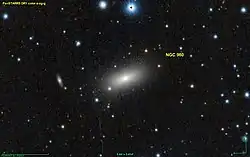NGC 980
NGC 980 is a lenticular galaxy located in the constellation Andromeda about 256 million light years from the Milky Way. It was discovered by the German - British astronomer William Herschel in 1786.[4][5][6]
| NGC 980 | |
|---|---|
 Pan-STARRS image of NGC 980 | |
| Observation data (J2000 epoch) | |
| Constellation | Andromeda |
| Right ascension | 02h 35m 18.56844s[1] |
| Declination | +40° 55′ 35.3546″[1] |
| Redshift | 0.019310[2] |
| Heliocentric radial velocity | 5733 km/s[2] |
| Distance | 256.2 Mly (78.56 Mpc)[3] |
| Apparent magnitude (B) | 14.3[2] |
| Characteristics | |
| Type | S0[2] |
| Other designations | |
| UGC 2063, MCG +07-06-038, PGC 9831[2] | |
iPTF 13ebh, a type Ia supernova, occurred in NGC 980.[7]
References
- Brown, A. G. A.; et al. (Gaia collaboration) (August 2018). "Gaia Data Release 2: Summary of the contents and survey properties". Astronomy & Astrophysics. 616. A1. arXiv:1804.09365. Bibcode:2018A&A...616A...1G. doi:10.1051/0004-6361/201833051.
- "NGC 980". SIMBAD. Centre de données astronomiques de Strasbourg. Retrieved 2020-05-30.
- Crook, Aidan C.; Huchra, John P.; Martimbeau, Nathalie; Masters, Karen L.; Jarrett, Tom; Macri, Lucas M. (2007). "Groups of Galaxies in the Two Micron All Sky Redshift Survey". The Astrophysical Journal. 655 (2): 790–813. arXiv:astro-ph/0610732. Bibcode:2007ApJ...655..790C. doi:10.1086/510201. S2CID 11672751.
- Ford, Dominic. "The galaxy NGC 980 - In-The-Sky.org". in-the-sky.org. Retrieved 2020-03-21.
- "Revised NGC Data for NGC 980". spider.seds.org. Retrieved 2020-03-21.
- "Your NED Search Results". ned.ipac.caltech.edu. Retrieved 2020-03-21.
- "iPTF 13ebh". SIMBAD. Centre de données astronomiques de Strasbourg. Retrieved 2020-05-30.
This article is issued from Wikipedia. The text is licensed under Creative Commons - Attribution - Sharealike. Additional terms may apply for the media files.